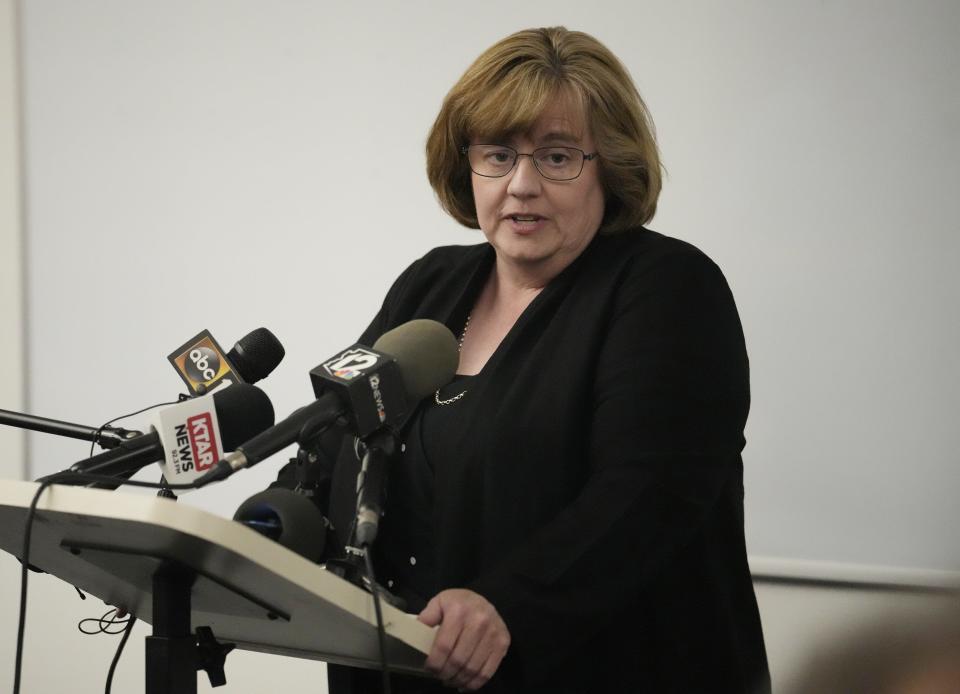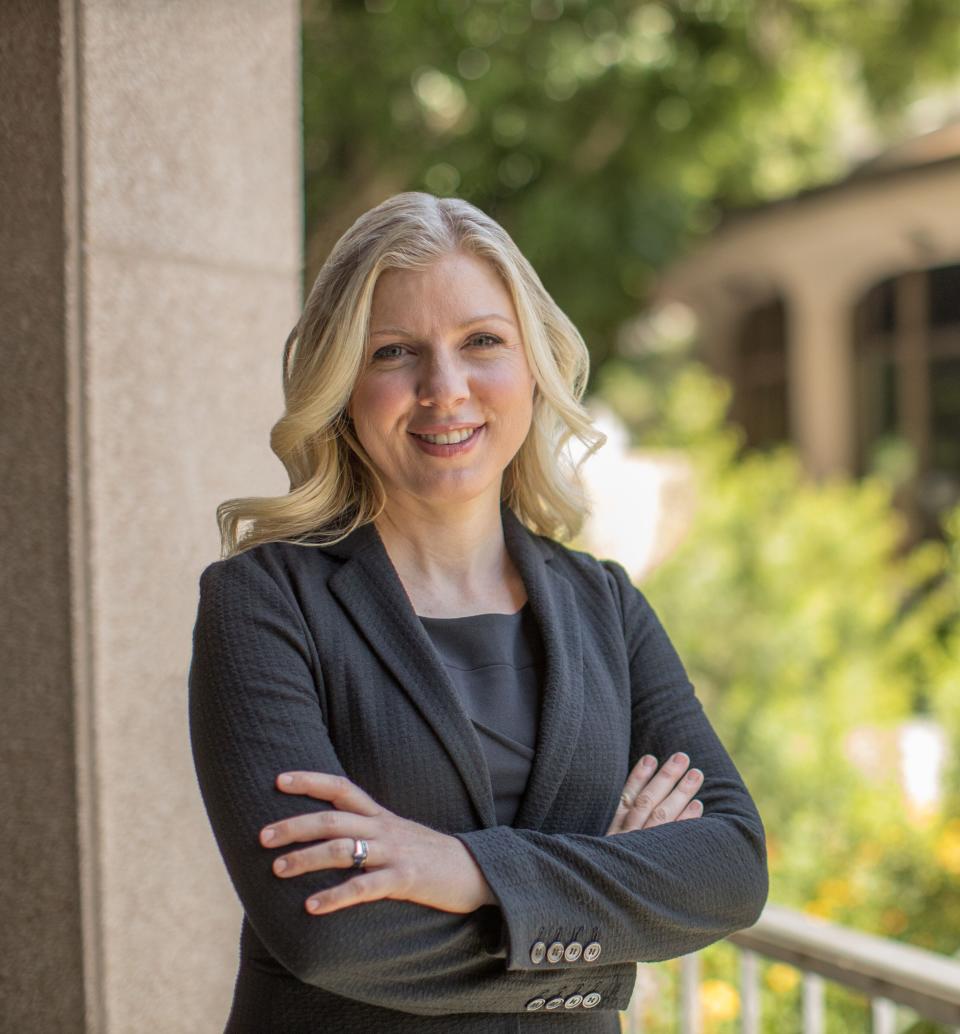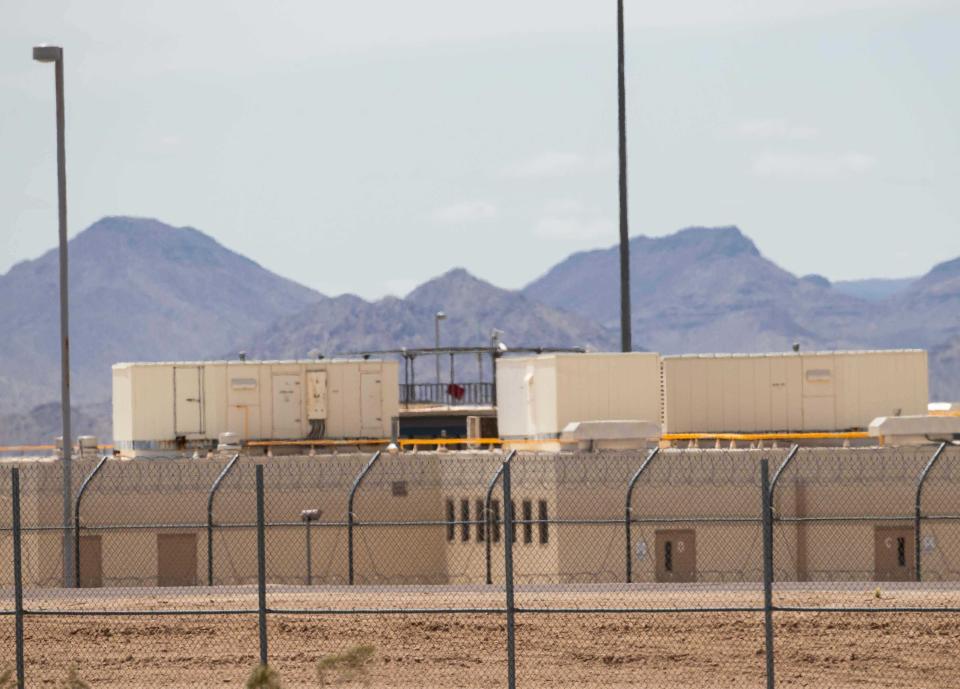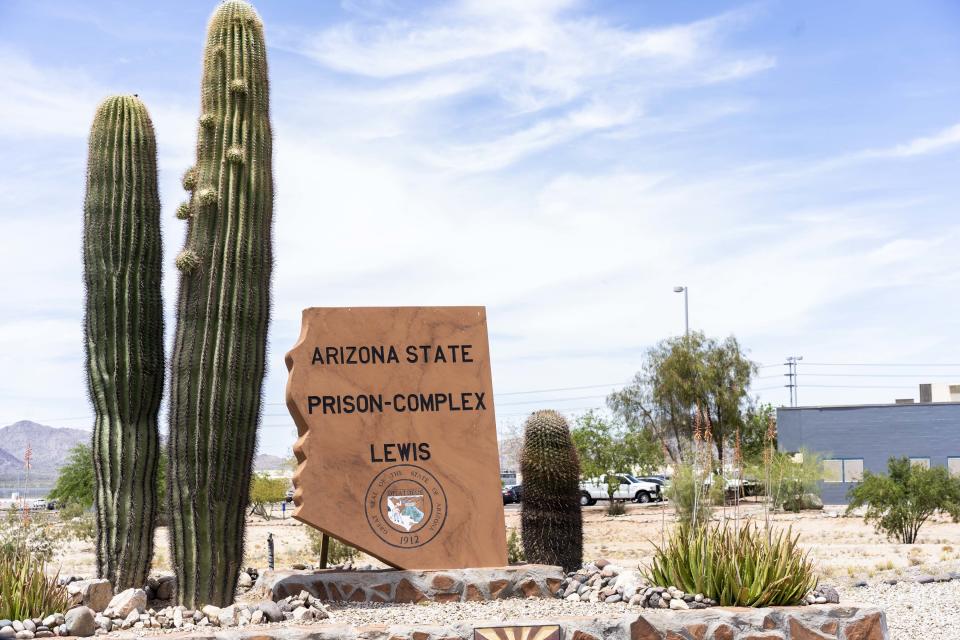Gunnigle, Mitchell: Maricopa County attorney candidates talk abortion, incarceration rates
- Oops!Something went wrong.Please try again later.
Two candidates with differing attitudes toward the criminal justice system are running to lead one of the largest prosecutor's offices in the country.
Republican Rachel Mitchell, the current county attorney, was appointed after the resignation of Alister Adel.
Adel’s departure triggered a special election to select who would serve out the remainder of her term, which ends on Jan. 1, 2025.
Mitchell has 30 years of experience as a prosecutor. She has served as a bureau chief at the Maricopa County Attorney’s Office overseeing teams of prosecutors including the sex-crimes bureau.
Democrat Julie Gunnigle has worked as a private practice attorney and as a prosecutor in Indiana between 2006 and 2007 and in Illinois from 2009 to 2011. She previously ran for county attorney but lost to Adel in the 2020 general election.
The Arizona Republic asked Mitchell and Gunnigle to respond to questions about how they would lead the county attorney’s office if elected. Their answers are printed below in full.
Abortion prosecution
Where do you stand on prosecuting anyone for their participation in an abortion? What will be your criteria.

Rachel Mitchell, Republican: First, I want to make it clear that I will not prosecute women for having abortions, and I will not revictimize survivors of rape, incest or molestation.
The recent court decision and subsequent appeal have not resolved which law among conflicting statutes now applies. There is no case submittal currently in front of my office; however, further clarity from the courts or policymakers is necessary before action on any such case could occur.
During a time of rising crime, my office will prioritize resources to address violent crime, fentanyl and threats to public safety.
Julie Gunnigle, Democrat: I will never criminalize Arizonans for abortion — not now, not ever. Not pregnant people nor their nurses and doctors. What my opponent’s recent flip-flop reveals is that she is willing to mislead voters about one of the most important aspects of their lives: their bodily autonomy.

By committing to prosecute health care providers, my opponent is ensuring abortion services are not available in Arizona because even if there is no penalty for women, no medical professional is willing to go to prison or lose their license to perform these procedures.
I have been clear and consistent since day one: I will never criminalize pregnant people, their support networks nor health care providers for private and personal health care, including abortion.
Reducing incarceration rates
Arizona incarcerates more people per capita than most other states in America. To what extent, if any, should Arizona reduce the numbers of people in jail and prison? Name one specific action you would take to reduce that number. What measure would you never take?
Gunnigle: An Arizonan is 7 times more likely to be thrown in prison than citizens in China, 2.5 times more than Belorussians living under a cruel dictatorship, and 2.6 times more than people living in Putin’s Russia.
While other prosecutors' offices have worked to enhance diversion programs, substance-use and mental health treatment as an alternative to incarceration, the Maricopa County Attorney’s Office (where) my opponent has worked in for 30 years has ramped-up sentences, instead opting to throw people into unsafe prisons where they are farmed out to prison labor camps owned by my opponent’s supporters. Instead, I will focus on reentry to productive society, advocate to give judges proper discretion, and treat addiction and drug offenses as the public health crises they are.

I will expand our use of Veterans' Court and other specialty courts, and I will work with prosecutors to finally get away from charge-stacking and mandatory minimums that cost taxpayers millions per year but lead to a 50% recidivism rate. I will never advocate for incarcerating addiction, and will work to build out the treatment options and community partnerships to make treatment an alternative to incarceration.
Mitchell: Maricopa County Attorney’s Office diversion programs offer an alternative to traditional case processing. This allows qualifying individuals accused of committing a crime to participate in community-based education or treatment programs that address behavioral change and personal improvement.

Election guide: November 2022
City races | School boards | State | Governor
| Ballot measures | Federal races | How to vote
It is a priority of my administration to provide treatment and other resources for those individuals who have committed offenses where addiction or mental illness may have contributed. Under my leadership, offers of diversion have increased, and it is my philosophy that those who qualify and want treatment and the opportunity to avoid criminal charges on their record should be given this opportunity.
Criminal justice policy
County attorneys frequently lobby the Legislature on bills related to criminal justice. Name one specific policy change you would advocate. Why?
Mitchell: My legislative priorities are to focus on the protection of women and children, support researched-backed criminal justice reform that does not jeopardize community safety, and ensure police and law enforcement are appropriately funded and supported.
Gunnigle: I will be a vocal advocate for judicial discretion and safety valve legislation. Safety valves allow judges in certain circumstances to sentence a person below the mandatory minimum if that sentence is too lengthy, unjust or unreasonable, or doesn’t fit the accused or the crime.
Safety valves don’t mean that people get off without any prison time, just that they don’t get more prison time than they deserve. In too many cases, judges’ hands are tied by mandatory minimums that prioritize incarceration over rehabilitation which ends up costing taxpayers millions while failing to improve public safety.
Disparities in minority incarceration
Data from the county attorney dashboard from the past three years shows Black people are disproportionately charged with crimes in Maricopa County. Discuss this disparity. How would you address it? Be specific.
Gunnigle: Until we engage in the root cause analysis this office has historically refused, this pattern of discrimination and racial targeting will continue. The disproportionate incarceration of Black Arizonans begins in the juvenile justice system and places youth at risk for becoming reinvolved with the justice system throughout the rest of their lives.
For this reason, I will advocate to end the school-to-prison and foster care-to-prison pipeline by ending zero tolerance policies, providing opportunities for restorative justice programs, and advocating for Raise the Age legislation to treat rather than throw away children whose brains are still developing.
To fix the injustices in the adult system that rip families apart and do generational damage, I will make available the disaggregated data, including charging and plea offers, from this office and create measurable goals of reducing racial disparities. For the first time, we will invest in evidence-based diversion programs, use deflection practices, and work to end mandatory minimums that disproportionately imprison communities of color, saving taxpayers’ money and earning the trust of communities who have been unfairly targeted by the Maricopa County Attorney’s Office.
Mitchell: As mandated by statute, the Maricopa County Attorney’s Office must review every case submitted by law enforcement. I am committed to ensuring that an individual’s race or ethnicity should never be taken into consideration when charging a case. I also believe it is important for my office to interact with minority communities to address issues affecting them.
'Revolving door': Data shows how marijuana laws incarcerated more people of color

State prison conditions
A federal judge recently found the prison system to be unconstitutional for its use of confinement, and a health care system that is “plainly grossly inadequate?” Will the finding that prison conditions are unconstitutional have any effect on your charging and plea-bargaining decisions or your sentencing recommendations?
Mitchell: The issue of incarceration is an area of important distinction between myself and my opponent. While my opponent has staked out a radical position that prisons by their very nature are evil, I believe incarceration exists to punish the most serious offenses and protect public safety.
During my 30 years as a prosecutor, much of that spent in sex crimes, I have encountered individuals who committed truly heinous crimes — including against women and children. Maricopa County needs a prosecutor who will hold these offenders accountable and protect our community — and that includes separating some individuals from society via the prison system.
Dangerous conditions in prison: Failure of state prisons to provide adequate health care examined
Gunnigle: Absolutely. The revelations from the recent Parsons trial showed that Arizona prisons are not just failing to rehabilitate people, but are not providing even basic health care or mental health treatment.
Ninety seven percent of people who are incarcerated in Arizona will one day be released, and unless they have access to programs to improve their lives, they are more likely than not to return to prison. This means that unsafe conditions inside Arizona prisons make the entire community less safe.
While the county attorney’s office doesn’t have control or oversight over Arizona prisons, I will be a vocal advocate for immediate change in their operation and independent oversight. When a crime warrants prison time, serving justice must be my primary objective. Nevertheless, when harm is more appropriately confronted by treatment and rehabilitation, I will ensure that taxpayer dollars aren’t being spent in a prison system designed to fail.
Being obsessed with filling prisons with people who have committed low-level, non-violent offences is why my opponent’s office has failed miserably at serving victims of violent crimes like rape and sexual assault. My opponent’s only answer is more prison time for minor offenses while less than 2% of sexual assault cases get convicted on her watch. That is not justice. Over-prosecution costs taxpayers, it costs victims and it deprives us all of justice.
Prosecuting law enforcement
Excessive force by law enforcement officers has been well documented in recent years, with the growing number of body-worn cameras by officers and citizen video. What criteria will guide your decisions to prosecute or decline to prosecute unjustified police shootings or uses of force?
Gunnigle: Every case warrants its own unique but uniform review process to ensure all the facts are laid out and justice is served as fairly for regular people as it is for insiders and allies. I’ll create an independent unit for police use of force cases to ensure that prosecutors are free from the inherent conflict of interest in having to review and act on police misconduct instances while also relying on these officers to win their other cases in court.
Investigations of police shootings, police brutality and other police misconduct will be assigned to an independent and community-involved unit separate from other prosecutors, and charging decisions will be made pursuant to a publicly-available timeline, not at 4 p.m. on a Friday to avoid the news cycle. It’s also time to end the influence police unions have over this office by ensuring lobbyists and political donors no longer get the special access they have long enjoyed under my opponent’s watch.
Mitchell: We review every case that comes before this office using the same standards. If our office determines an officer used excessive force and there is a reasonable likelihood of conviction, we will file charges. Nobody is above the law.
Public perception of prosecutor behavior
Prosecutorial misconduct can undermine public confidence in the entire legal system. MCAO has had recent challenges, including the case of protesters facing street gang charges and the conduct of Juan Martinez, for example. How would you review prosecutors’ tactics and behavior and provide appropriate discipline and oversight?
Mitchell: Throughout my career and since being sworn in as county attorney, I have demonstrated a commitment to accountability at all levels. The office has an ethics committee that reviews reports of concern and complaints and we take appropriate follow-up action. Misconduct is not tolerated.
In addition, I have directed staff to review and strengthen policies related to the conduct of the elected county attorney. By leading with integrity, the reputation has quickly improved as evidenced by our dramatic reduction in vacancy rate, ability to recruit and retain new attorneys, and importantly, the return of prosecutors who had left the office to pursue other opportunities.
Gunnigle: There is a lot of work to do when trying to change the decades of corruption ingrained into an institution by my opponent and her mentors, but it is necessary in pursuit of real justice. We’ve seen historic turnover and low morale at MCAO as line prosecutors no longer want to work under the current leadership, leaving the rest to be overloaded and under-supported. This environment creates too many opportunities for poor oversight and mistakes.
Even in the last few months, we’ve seen my opponent excuse misconduct in high-profile cases where the state lied and misled the grand jury to get an indictment. In contrast, I will immediately rehire the dozens of experienced prosecutors who left due to chronic-leadership scandals and ineptitude, and begin building a culture of accountability that values prosecutors doing justice, instead of merely counting convictions. The best way to ensure staff oversight and appropriate conduct is to be completely transparent about everything we do as government employees who must be responsible to the public.
Marijuana
What are your thoughts about the scope, pace, appropriateness and effectiveness of the efforts to purge minor marijuana charges?
Gunnigle: Efforts to repair the harm caused by the Maricopa County Attorney’s Office’s regressive marijuana policies of the past are not moving fast enough. I will dismiss all pending low-level cannabis cases as voters demanded two years ago and make expungement universal and automatic.
Decades of data show the prosecution of low-level drug possession charges has not made our communities safer but has cost taxpayers millions in legal and private prison expenses.
At last estimate, there are still over 100,000 arrests, convictions, or adjudications for marijuana that need to be cleared in our county alone. People who faced these injustices deserve to have their convictions erased without jumping through additional hurdles.
Mitchell: In 2020, voters approved an initiative to legalize recreational use of marijuana. This office has made every effort to honor the will of the voters and has proactively both dismissed and expunged cases that are outlined in Proposition 207. To date, our office has proactively processed more than 16,000 petitions to expunge, and responded to more than 1,600 defendant requests filed with the court for expungement.
Have a news tip on criminal justice issue? Reach the reporter at jjenkins@arizonarepublic.com or at 812-243-5582. Follow him on Twitter @JimmyJenkins.
Support local journalism. Subscribe to azcentral.com today.
This article originally appeared on Arizona Republic: Maricopa County attorney: Candidates Gunnigle, Mitchell on the issues

